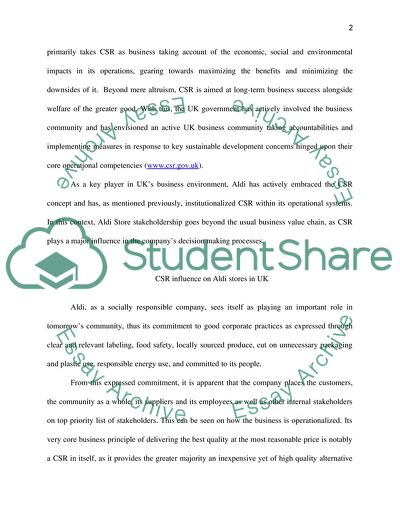
- Home
- Free Samples
- Premium Essays
- Editing Services
- Extra Tools
- Essay Writing Help
- About Us
- Studentshare
- Subjects
- Miscellaneous
- Stakeholder Analysis on Aldi (retail store)
Stakeholder Analysis on Aldi (retail store) - Essay Example

- Subject: Miscellaneous
- Type: Essay
- Level: Undergraduate
- Pages: 4 (1000 words)
- Downloads: 0
- Author: hpollich
Extract of sample "Stakeholder Analysis on Aldi (retail store)"
Specifically, Aldi commits to the following: (1) clear and relevant labeling; (2) food safety; (3) locally sourced produce; (4) cutting unnecessary packaging and plastic usage; (5) responsible energy use; and, (6) commitment to their people (FAQs, www.aldi.com.uk). Stephen Timms, Minister for Energy, e-commerce and Postal Services of the UK government, 2008, states that CSR can be simply defined generally “as the business contribution to sustainable development.” Other definitions of CSR are available, but the UK government primarily takes CSR as business taking account of the economic, social and environmental impacts in its operations, gearing towards maximizing the benefits and minimizing the downsides of it.
Beyond mere altruism, CSR is aimed at long-term business success alongside welfare of the greater good. With this, the UK government has actively involved the business community and has envisioned an active UK business community taking accountabilities and implementing measures in response to key sustainable development concerns hinged upon their core operational competencies (www.csr.gov.uk). As a key player in UK’s business environment, Aldi has actively embraced the CSR concept and has, as mentioned previously, institutionalized CSR within its operational systems.
In this context, Aldi Store stakeholdership goes beyond the usual business value chain, as CSR plays a major influence in the company’s decision making processes. Aldi, as a socially responsible company, sees itself as playing an important role in tomorrow’s community, thus its commitment to good corporate practices as expressed through clear and relevant labeling, food safety, locally sourced produce, cut on unnecessary packaging and plastic use, responsible energy use, and committed to its people.
From this expressed commitment, it is apparent that the company places
...Download file to see next pages Read More
- TERMS & CONDITIONS
- PRIVACY POLICY
- COOKIES POLICY